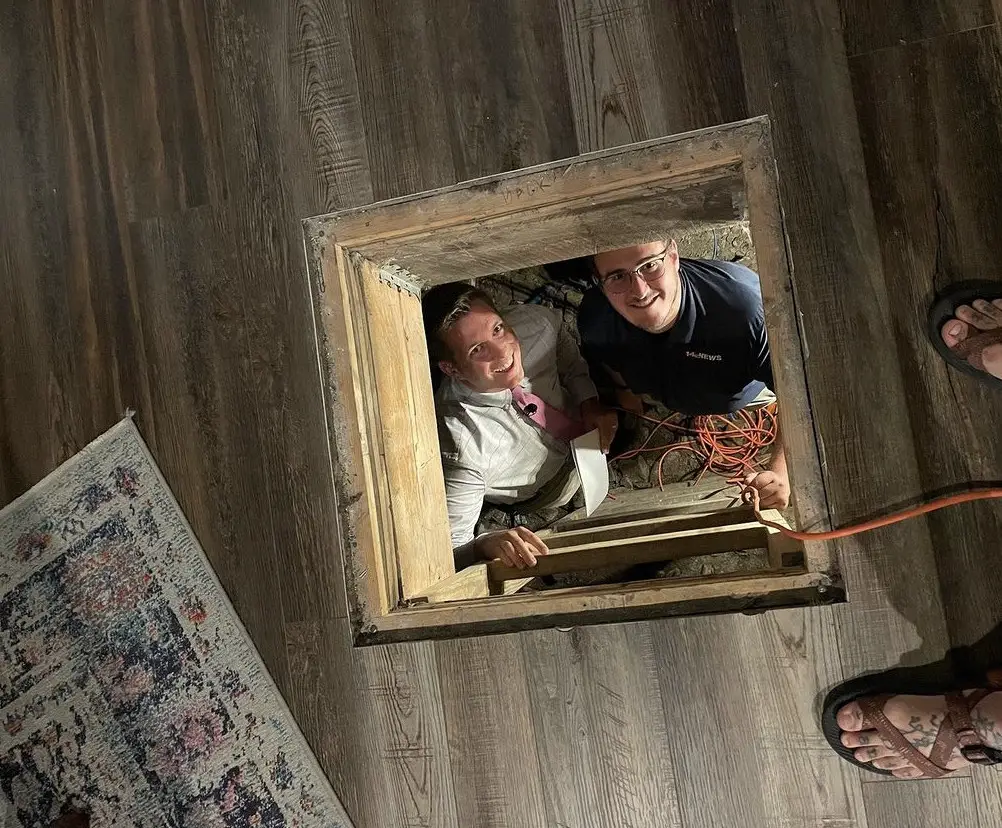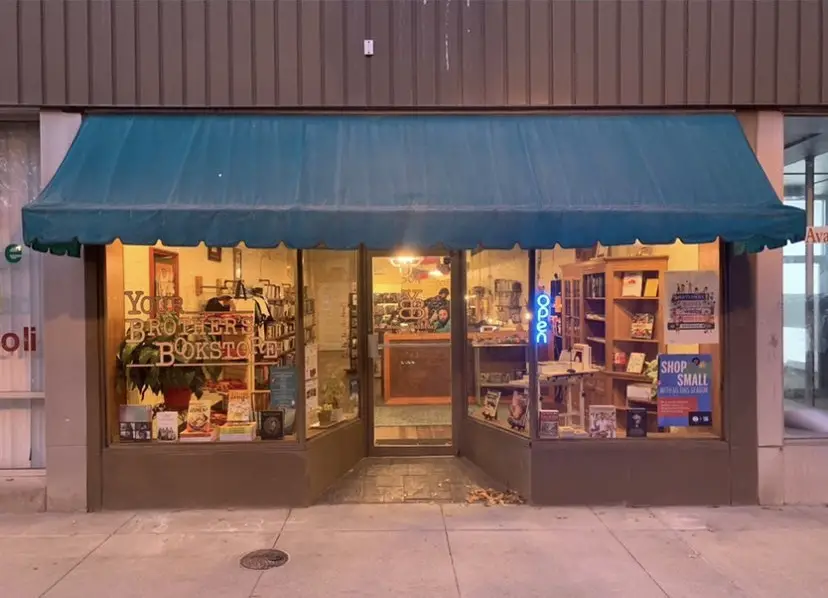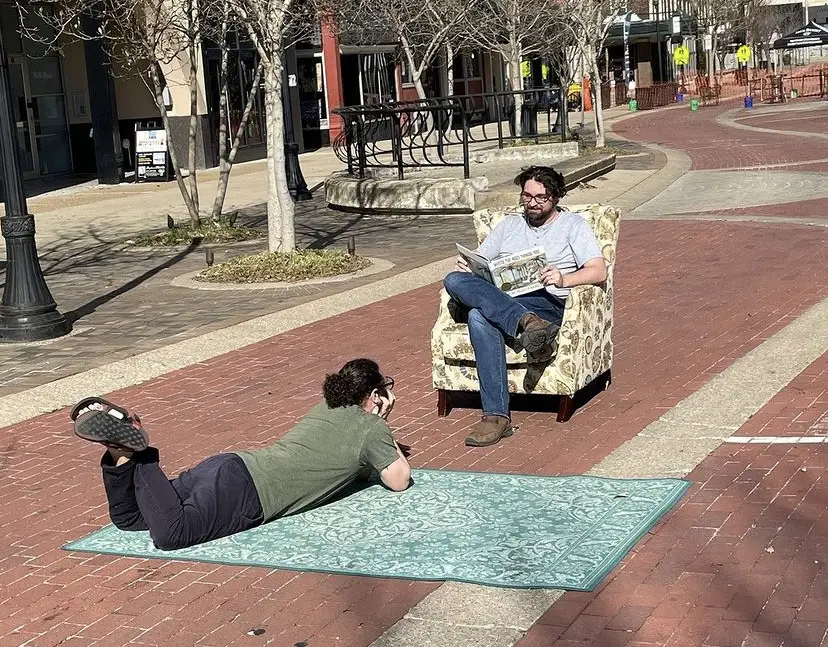It happened the way you’d expect it to happen in a movie—workmen uncovered a secret passage while renovating an old shop. They’d been contracted by brothers Adam and Sam Morris to redo the floors as the pair prepared to convert a defunct ballet studio into what became Your Brother’s Bookstore.
The pair held their breath as they descended, likely the first human beings to use the short wooden ladder in recent memory. The 10-foot square room, lit only by the light from the trapdoor, had an extra-close vibe. Sam who stands 6-foot-4, had to stoop to look around, but there still was that sense of magic that accompanies discovery.
Related: Déjà Vu Fun in Rediscovery of Now Heirloom Bookstore
For decades, rumors that there were secret chambers below the city that were used as part of the Underground Railroad captured the imagination of locals and the brothers thought they might have evidence.
“It’s one of those things that like everyone says and then no one questions,” Sam said. “Word got to our local African American museum and they contacted us.

The museum sent a curator who specializes in fieldwork, but after an extensive investigation, she couldn’t find any concrete evidence, but there was another explanation—bootlegging.
There was a small hole in the wall, too small for most of the men to get through. The Morrises assumed it was just a connector to the neighboring pizza joint. Another of the African American museum workers was a smaller guy who was able to shimmy through and it opened up an entirely new interpretation. He found still parts, discarded bottles, and even tables and chairs that suggested it was an underground gambling den and illegal alcohol production room.
There was one section that could have conceivably been for the Underground Railroad but any hard evidence probably didn’t survive the Roaring 20s. Indiana went dry two years before national prohibition went into effect and, therefore, had a lively illegal operation.
The Numbers Add Up
Adam and Sam lived separately as teenagers but stayed close by hanging out together at the local Borders Books when they were kids. Adam worked at Borders, while Sam came to drink Italian sodas and kibbutz. Eventually, the brothers left Evansville, Indiana, to seek their fortunes—Adam to New York City and Sam to the U.S. Air Force. More than a decade passed and they found themselves back in Evansville. This time, Adam was at the Barnes and Noble and Sam, who had earned his MBA, was working for a software company.
“Adam calls me one day and tells me that he’s leaving Barnes and Noble and he wants to open his own bookstore,” Sam said.
Related: The Most Famous Bookstore in the World
As a newly-minted MBA, Sam was confident that he knew everything about business and that his brother’s idea was untenable at best.
“I immediately jumped on board and basically I said, ‘Let me come with you and help you figure out that this is a terrible idea,’” Sam said.
But as hard as he tried, he couldn’t find the flaw.
“I couldn’t have been more wrong,” he said. “The market research bore out that independent bookstores are not just doing okay but actually growing, while the big corporate bookstores are having trouble competing with each other.”

Not long before they opened, the brothers discovered they weren’t the only ones who saw the need and opportunity for an independent bookstore in town. Bluestocking Social, owned by a husband and wife team, looked to be a wild card at first, but as it turned out, there was plenty of room for both of them.
Rethinking Your Brother’s Bookstore
Adding in the Barnes and Noble, there are three stores selling new books within five miles of one another. The thing is, though, indie bookstores have made a transformation that has undermined the big box-store threat.
Bookshops are a destination for people who prefer to shop in bookstores. What has emerged isn’t unlike the rise of independent coffee shops. Sure, there’s a Starbucks on every corner, but they are essentially a different animal from a local roastery, with different client bases and expectations.
Bluestocking Social was an art-focused concern, selling art and art supplies. Their selection is more focused on serious and literary works than Your Brother’s, Sam said.
“We have kind of a focus on Sci-Fi, fantasy, and weirder fiction. We also branched into board games and role-playing games in a large way,” Sam said. “What we have found is when we work together, we both have a lot more resources than either of us do for being a year old on our own, and it lets us kind of punch above our weight class a little bit.”
When the pair started, there was something of a learning curve as Adam readjusted from Barnes and Noble thinking. For example, Your Brother’s Bookstore started out with more John Grisham than they really needed, but they settled into their niche quickly enough.
Today, Your Brother’s Bookstore is home to the Midwest Writers Guild and is building its reputation as a place for local authors to meet as well as to sell their books. Independently published books can be a difficult proposition for bookstores, but the brothers have established a consignment program that makes it easier for them to accept and promote local authors.
A Center for the Arts
In addition to the trap door, the brothers also acquired a second floor when they bought the building. While they were using it for storage at first, now that they’ve moved most of the Grisham downstairs, they hope to put it to much better use in the near future.
“The goal is to have no product up there and just have it be a space that’s for the neighborhood,” Sam said. “It’s community space.”
He’s been in touch with the local arts council with an eye on starting a movie night. The brothers hope to offer writing classes and possibly art classes. They may even invite the high school chess team to set up shop there. It is a place of possibility, if not as much a place of mystery as the tunnels running beneath the building, but at least it is more useful.

Still, there’s nothing like a bookstore that has its own story, especially an open-ended one. As news comes out about Your Brother’s Bookstore and the tunnels, people are finding an outlet for contextualizing local history.
Sam said a local author told them he was doing genealogy, and he found out that his great grandfather was the captain of the police boat that was smuggling whiskey from Kentucky into Indiana and did federal time for it.
“Apparently, there was a huge corrupt police angle to this whole story that we’re just finding more and more out about as we as people are finding out about it,” Sam said.
The trap door remains, covered with a small rug. There’s no sane or safe way to make it part of the store, but knowing it is there and that it may yet have more secrets to reveal elevates the store’s cool factor.
